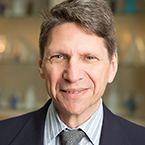
For enriching the understanding of tumor immunology and immunotherapy through his discovery of gamma-delta T cells and interferon-producing killer dendritic cells and for his contributions to developing GVAX and Listeria monocytogenes-based cancer vaccines.
A leading light in cancer research, Dr. Pardoll is recognized for his pivotal work in the fields of tumor immunology and immunotherapy that have revolutionized precision cancer therapies. His seminal research contributions have expertly shaped the fields of dendritic cell biology and immune regulation. He is responsible for several fundamental advances in cellular immunology, including the characterization of gamma-delta T cells and interferon-producing killer dendritic cells. In addition, Dr. Pardoll has elucidated the role of signal transducer and activator of transcription 3 (Stat3) signaling in tumor immune evasion. His research contributions have demonstrated that constant Stat3 activation can maintain constitutive NF-κB activity in tumors by inhibiting its nuclear transport and ultimately resulting in upregulation of antiapoptotic and oncogenic genes. Dr. Pardoll has also uncovered that T helper 17 (Th17) cell development is dependent on Stat3 and that Stat3-driven Th17 response promotes cancer development.
Importantly, Dr. Pardoll has also contributed to the characterization of key checkpoint ligands and receptors in regulatory T cells, including lymphocyte-activation gene 3 (LAG-3) and neuritin which are now being clinically targeted for patient therapeutics. Critically important were his contributions to the discovery of B7-DC/PD-L2, the second ligand found to be associated with the immune checkpoint receptor PD-1 and widely expressed in tumor cells. The expression of PD-L2 was identified in dendritic cells and later found to bind to PD-1 but not CTLA-4, strongly co-stimulating interferon gamma but not interleukin IL-4 and IL-10, a finding that has shed further light on the PD-1 pathway that has been crucial to the emergence of the field of tumor immunology. He is also credited with the development of several immunotherapies, including GVAX cancer vaccines and Listeria monocytogenes-based cancer vaccines.
Selected Awards and Honors
2018 Elected Fellow, National Academy of Inventors, Tampa, Florida
2009 Member, Advisory Board, City of Hope Cancer Center, Los Angeles, California
2006 Member, Cancer Immunology Steering Committee, National Cancer Institute, National Institutes of Health, Bethesda, Maryland
1997-1999 Program Committee, American Association for Cancer Research
1995 Experimental Therapeutics Research Award, Burroughs Wellcome Fund, Research Triangle, North Carolina
1994 Elected Member, American Society for Clinical Investigation, Ann Arbor, Michigan
1992 Selected Member, Scientific Advisory Board, New York City, New York